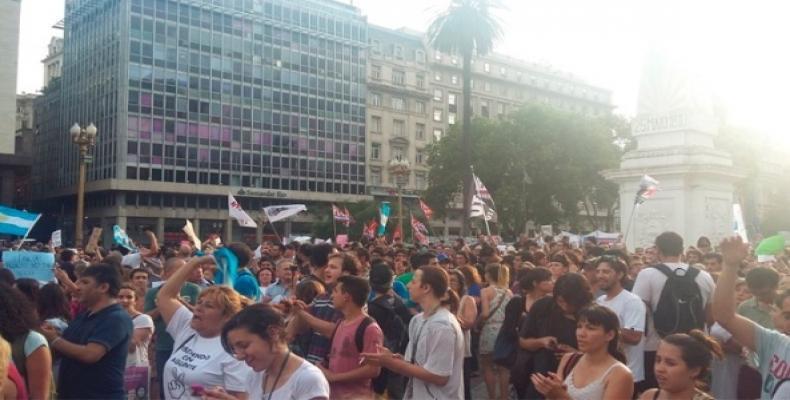Buenos Aires, December 15 (teleSUR-RHC)-- Thousands of Argentinians protested on Monday against President Mauricio Macri's plans to dump regulations aim to promote media diversity.
Crowds met at Buenos Aires' Plaza de Mayo, demanding Macri reverse plans to dramatically overhaul Argentina’s Media Law.
First introduced in 2009, the law aimed to limit the number of broadcast licenses a single corporation can hold. It also specifically set aside a set number of licenses for community groups like churches and cultural organizations. While supporters of the law argued it would diversify Argentina's media landscape, the new regulations were fiercely opposed by media giant Clarin Group. Clarin fought the legislation in courts for years, complaining the law would force it to sell off some of its operating licenses. Clarin is Argentina's largest private media company.
In 2013, Clarin's allegations that the law was unconstitutional were dismissed by the Supreme Court.
"A law that set limits a priori is legitimate because it favors freedom of speech by limiting market concentration," the court's ruling stated.
Macri's new government has argued reforming the legislation won't impact media diversity, though critics have accused the new president of seeking to curry favor with Clarin and other major private media companies.
Macri won Argentina's presidential elections in November, marking the first time the right wing has taken power through democratic means.
Along with vowing to reform the Media Law, Macri, a businessperson and former mayor of Buenos Aires, has promised to cut capital controls and trade restrictions in the name of boosting Argentina’s ailing economy. He is also expected to cut subsidies to the energy and transportation sectors.
"The is the beginning of a new era that has to carry us toward the opportunities we need to grow and progress," Macri told supporters after the vote.
Critics say Macri’s proposals will turn the country back to 1990s neoliberalism, rolling back the social welfare programs by President Cristina Fernandez and her late husband and former President Nestor Kirchner, which have benefited the poor and working class.


